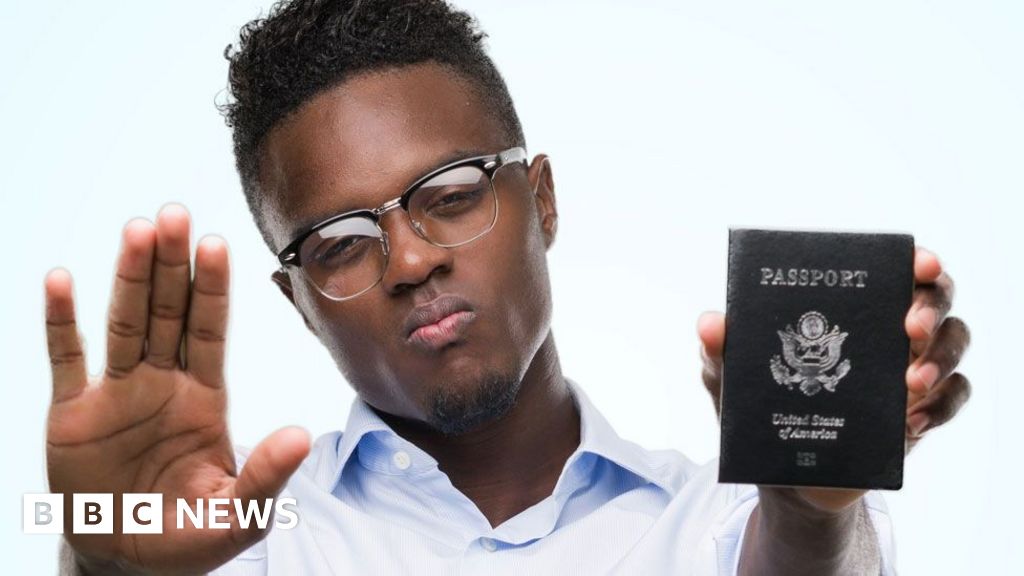Namibia turns the visa tables on Western countries

 Getty Images
Getty ImagesNamibian Michelle Nehoya has spent nearly $500 (£390) on the application process for a visa to visit Canada – but almost two years later it has yet to materialise.
The 38-year-old, who lives in Namibia’s capital, Windhoek, is desperate to get to Quebec to see her aunt and cousins whom she has not seen for almost a decade.
The visa application has involved filling in multiple forms – and among other requirements, she has also had to provide six months of bank statements, an invitation letter plus a detailed travel history.
There is no way to apply in Namibia, so this has also meant travelling to South Africa to submit her biometric data, which involves giving her fingerprints and having a photo taken.
Her experience is not uncommon for Africans travelling to Western countries.
In 2022, seven of the top 10 countries with the highest visa rejection rates in the bloc of European countries known as the Schengen area were African, according to consultancy firm Henley and Partners.
“It has been lengthy and frustrating. I haven’t been given any reason why it’s taken so long,” Ms Nehoya tells the BBC.
However, if her family in Quebec decide to travel to Namibia on Canadian passports, they will not face anything like the challenges and costs she encountered. Canadian citizens can currently enter Namibia without a visa.
But this will change in eight months’ time.
From next April, Canadian nationals, along with those from Germany, the US, the UK and 29 other countries, will require a visa for entry.
These include all “non-reciprocating countries” – meaning the new visa rules will affect citizens from all countries that require Namibian passport holders to have visas.
“Namibia has extended gestures of goodwill and favourable treatment to nationals of various countries. However, despite these efforts, certain nations have not reciprocated,” Namibia’s immigration ministry said in May.
“In light of this disparity, the government has deemed it necessary to implement a visa requirement to ensure parity and fairness in diplomatic interactions.”
But these visitors will be able to buy their 90-day visa, costing $90, on arrival in Namibia – unlike the onerous requirements placed on African passport holders who need to get their visas beforehand.
The British High Commissioner to Namibia, Charles Moore, said he respected the right of Namibia to impose new regulations.
“[The UK] unfortunately imposed a visa regime on Namibia last year due to the number of asylum seekers we were receiving. That was impacting on our relationship with Namibia,” he said.
A statement from the UK government further explained there had been a sustained and significant increase in the number of asylum applications from Namibians at the UK border since 2016.
“This constitutes an abuse of the provision to visit the UK for a limited period as non-visa nationals,” it said.
 Michelle Nehoya
Michelle NehoyaFor Ms Nehoya, Namibia’s visa announcement is long overdue: “I think it is fair. It feels like Namibia is standing up for itself.”
The reactions on social media to the news echo her sentiments.
“Finally. I hope they also require them to submit a bible of documents, take medical tests, [and] Namibian language tests,” wrote one commenter.
Another said: “If I need to bring bank statements… and all sort of documents and still buy visa just to gain entry to a country, that country should also do the same to gain entry to my country.”
And visas for the Schengen area, the US and Canada do not come cheap for African passport holders.
The European Union made more than €53m ($58m; £45m) on rejected visa applications from African countries in 2023, according to a recent report by the Lago Collective, a think-tank that focuses on migration.
Visas can be rejected for multiple reasons. The report says most rejections are based on “reasonable doubt about the visa applicant’s intention to return home”.
In June 2024, the price of Schengen short-term visas went up from €80 to €90 for adults, and in October 2023, the UK visa fee rose from £100 to £115.
The report also showed that nearly a third of Africans applying for a visa to the Schengen area were rejected, higher than the global average.
Even when visas are approved, African travellers say their experiences at border security make them feel uncomfortable and unwanted.
Winnie Byanyima, the head of UNAids and who is herself Ugandan, drew attention to this when she tweeted in 2022: “I’m at Geneva airport, I’m almost refused to board, all documents scrutinised over and over again, calls made… I board last.”
 Getty Images
Getty ImagesDespite Namibia’s visa initiative receiving praise on social media, the tourism industry is less enthusiastic.
The Hospitality Association of Namibia said it was “very concerned” about the message it “sends to the global travel trade”.
In 2022, the tourism sector accounted for 7% of GDP, making it the third largest contributor to the economy – with most tourists coming countries such as Germany and the US.
Though Soni Nrupesh, a tourism expert based in Windhoek, believes the visa move will not deter visitors: “It will not change much; you can still get on a plane without a visa.
“It’s just when you get to the airport you will fill a form pay the fees and enter.”
Prospective travellers like Ms Nehoya hope this kind reciprocity will be the future for everyone.
“People come to Namibia, and they love it. But we also want to see what is happening on the other side,” she says.
“It would be nice to go to Canada, the US or the UK and just get a visa on arrival. But right now, we must plan everything so far in advance.”
You may also be interested in:
 Getty Images/BBC
Getty Images/BBCRelated
Calls for over 60 free bus travel update from Department…
Calls for free bus travel for those over the age of 60 in England is gaining more attention after an increase of support. Unlike those in Wales, Scotland, and N
Major UK train station is one of the worst places…
Pickpockets are a problem across the UK, but one place is the worst for having your belongings stolen. According to the British Transport Police (BTP), just und
UK Snow Travel Chaos: Kent, East Sussex, West Sussex, Hampshire,…
UK Snow Travel Chaos: Kent, East Sussex, West Sussex, Hampshire, Wiltshire, Surrey, Berkshire, Greater London, Essex, Suffolk, Hertfordshire,
‘Only travel if necessary’ warning as UK’s busiest motorway shut…
NATIONAL Highways have issued an urgent warning to drivers as one the UK's biggest motorways shuts for the weekend. They has urged drivers to re-plan their rou












